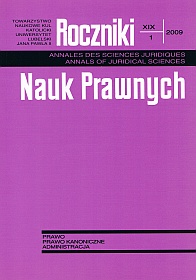Personal Social Rights in Polish Constitutions
Abstract
The article aims at presenting the evolution of people’s guarantee of their social rights enshrined in Polish constitutions, beginning with the March Constitution of 1921. That constitution addressed the issue of social rights but to a limited degree. It pointed to the freedom of work, freedom of assembly and the right to social security. Such perspective did not differ much from the accepted standards of constitutional regulation of the time. Subsequently, the constitution of 1935 disregarded human rights, emphasising only civil obligations. The constitution of 1952, however, did feature a long catalogue of personal social rights. It is of note that the subject now was not a “human” but “citizen”, therefore the rights contained therein were deprived of their universal nature. The superiority of social rights over the political ones was now stressed. The interpretation and implementation of human rights were influenced by values that were thought to form the basis of legal order, such as social ownership. The interpretation of social rights changed along with the political and socioeconomic transformation in the constitution of 1992. Yet, the most radical alterations are contained in the Constitution enacted in 1997. These changes were significant not because the array of rights was now markedly greater, but because the axiological dimension which affected the interpretation of the rights was altered. The following values and principles were assumed to be fundamental: the principle of a democratic state of law, the principle of social market economy, the freedom of economic enterprise and private ownership. All recognised freedoms and rights of persons now followed from the inherent dignity of human beings. Human dignity, at the same time, forms the source and limits of rights and freedoms.
References
Bucińska J.: Godnośc człowieka jako podstawowa wartość porządku prawnego, „Prawo, Administracja, Kościół” 2001, 2-3, s. 31-50.
Complak K.: O prawidłowe pojmowanie godności osoby ludzkiej w porządku RP, w: Prawa i wolności obywatelskie w Konstytucji RP, red. B. Banaszak, A. Preisner, Warszawa 2002.
Complak K.: Uwagi o godności oraz jej ochrona w świetle nowej Konstytucji, „Przegląd Sejmowy” 1998, nr 5, s. 43-51.
Jabłośski M.: Rozwazania na temat znaczenia pojęcia godności człowieka w polskim porządku konstytucyjnym, w: Prawa i wolności obywatelskie w Konstytucji RP, red. B. Banaszak, A. Preisner, Warszawa 2002.
Kamiński A.: Uwagi o ustroju III RP w świetle porównawczych badan politologicznych nad typami rzadów i ordynacja wyborcza, „Ruch Prawniczy, Ekonomiczny i Socjologiczny” 2004, z. 3, s. 19-28.
Michalska A.: O pojeciu praw człowieka, „Panstwo i Prawo” 1980, z. 8, s. 3-13.
Pecherski M., Swi^tek M.: Organizacja oświaty w Polsce w latach 1917-1977. Podstawowe akty prawne, Warszawa 1978.
Prawa człowieka. Model prawny, red. R. Wieruszewski, Wrocław 1991.
Waśkiewicz H.: Prawa człowieka. Pojecie, historia, „Chrześcijanin w świecie” 1978, nr 63-64, s. 13-48.
Zawadzka B.: Prawa ekonomiczne, socjalne i kulturalne, Warszawa 1996.
Copyright (c) 2009 Roczniki Nauk Prawnych

This work is licensed under a Creative Commons Attribution-NonCommercial-NoDerivatives 4.0 International License.


